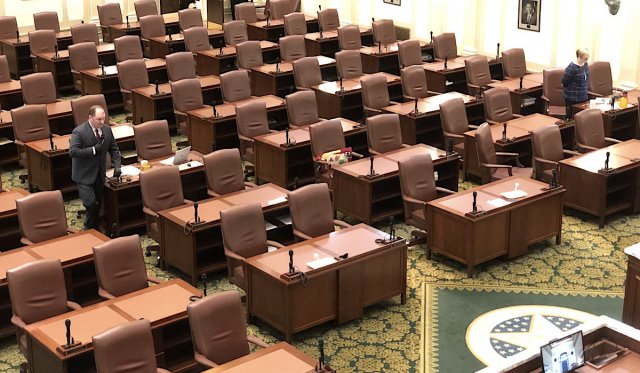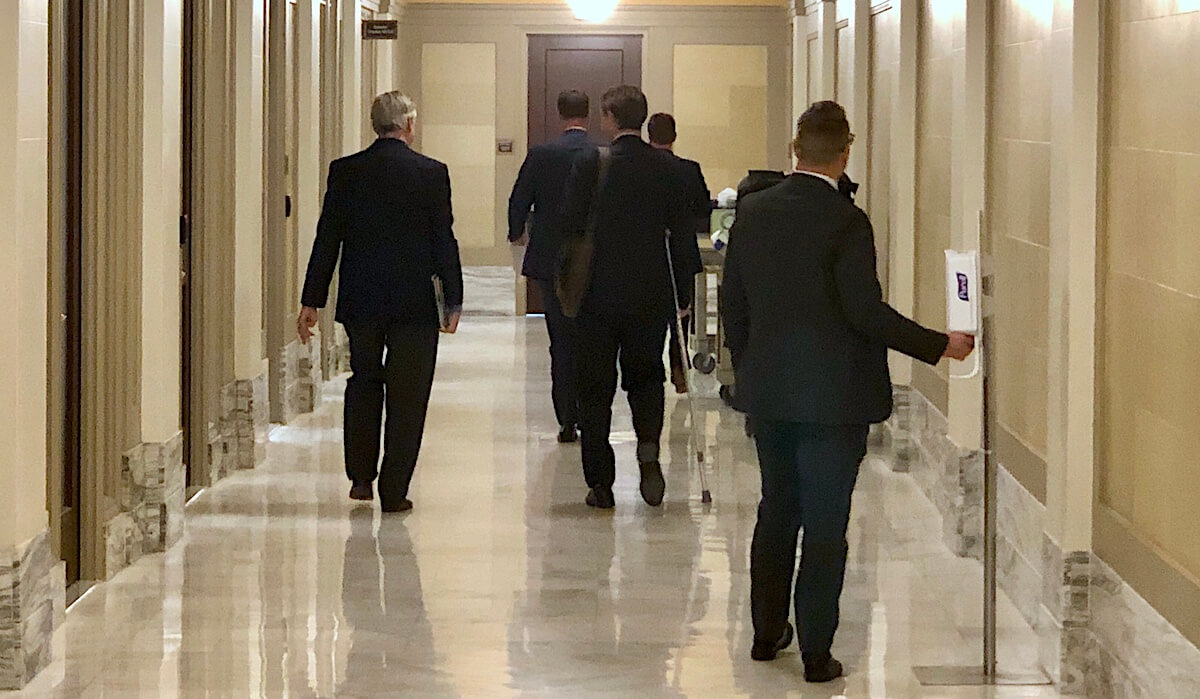
Two hours after Gov. Kevin Stitt floated the notion of state budget cuts at a COVID-19 press conference, House Speaker Charles McCall and Senate President Pro Tempore Greg Treat responded to the idea with a 358-word press release that could be boiled down to one syllable: No.
“When Oklahomans are struggling, I’m going to protect the taxpayer. And asking state agencies to cut expenses by 1 or 2 percent seems very reasonable to me,” said Stitt, clarifying that he is open to cuts for the end of Fiscal Year 2020 and Fiscal Year 2021.
McCall (R-Atoka) said the Legislature made its FY 2020 position clear the previous day when it sent Stitt three bills that would address Oklahoma’s revenue failure caused by the global economic slowdown and crashing oil prices.
“The Legislature will not authorize cuts to core services during a pandemic response because the public needs its services right now,” McCall said. “The state’s reserves, which exist for emergencies just like this, are sufficient for services to continue uninterrupted.”
Monday, lawmakers sent Stitt bills intended to avoid state agency cuts amid an expected $416 million revenue shortfall, but SB 617 specifically omitted the restoration of funding for Oklahoma’s digital transformation efforts, which Stitt has championed since assuming office. Legislative leaders said their single, targeted cut amounts to less than $1 million and said the Digital Transformation Program Revolving Fund has more than $8 million in it.
Standing in front of a forklift and thousands of cardboard boxes at the Oklahoma State Department of Health’s strategic PPE stockpile, Stitt declined to say today whether he intends to sign the three bills.
“We are in the middle of those negotiations,” Stitt said. “Asking the state government to also cut expenses by 1 or 2 percent is very reasonable in the current situation we are in.”
Stitt said the Legislature’s cut to his digital transformation fund — aimed at improving the public’s access to government services using modern technology — was “part” of the reason he cancelled Monday’s scheduled Board of Equalization meeting, which was set to officially declare the revenue failure.
“When there’s just one agency that was singled out to be cut, that was part of our reasoning. So we’re back at the drawing board, and every option is on the table,” Stitt said. “But until we have that [Board of Equalization] meeting, you can’t grab the $300 million out of the savings account.”
Treat (R-OKC) said Monday that he did not know why the governor had cancelled the Board of Equalization meeting, and he said he did not know why the House had amended SB 617 to single out digital transformation funding for a cut. But Tuesday, he stood with House leadership.
“The Legislature, both Republicans and Democrats by overwhelming margins, took the necessary actions to protect state services from deep budget cuts,” Treat said in the press release. “In the midst of a catastrophic health emergency, we must prevent budget cuts to public schools, health care, first responders and other core state services.”
RELATED
Cluster-stuck: Stitt gets emergency powers, but budget bills boil over by Tres Savage
Treat said he hopes Stitt signs the three bills, and McCall noted the margin of support that each bill received, with only one member in each chamber opposing any of the bills.
“The position the Legislature stated by veto-proof majorities Monday is not changing,” McCall said. “The legislative branch controls the power of the purse, and we have made our position clear on behalf of our constituents across the state.”
Treat concurred.
“The Legislature is a co-equal branch of government vested with the authority to write the budget. We take that role seriously.”
Stitt declined to discuss his specific negotiations with the Legislature, but he did say lawmakers need to have long-term perspective about state finances.
“I don’t want to get into the specifics of he-said-she-said and what goes on at the Capitol,” Stitt said. “In nine months, we’ll be back up [there] in January talking about the 2022 budget. We have three issues we are trying to solve.”
Senate Minority Leader Kay Floyd (D-OKC) released her own statement later Tuesday, agreeing with Treat and McCall.
“Today, Gov. Stitt floated a proposal to cut funding for state agencies by 1 to 2 percent. Oklahoma Senate Democrats were disappointed to hear this and are strongly opposed to budget cuts to core services,” Floyd said. “Every day dedicated and hard-working state employees are on the frontlines of Oklahoma’s efforts to combat the spread of COVID-19. Now is not the time to be reducing much needed resources for state agencies. Oklahoma Senate Democrats call on Gov. Stitt to act quickly to prevent a revenue failure by convening the State Board of Equalization and signing the budget bills passed by the Legislature.”
Asked through his communications director on Monday, McCall declined to comment on why the House singled out the digital transformation funding.
The three measures the Legislature sent to Stitt’s desk were:
- SB 617 allowing the Office of Management and Enterprise Services to withdraw up to half of the balance of the Revenue Stabilization Fund to distribute to agencies to avoid cuts owing to the revenue failure;
- SB 199 appropriating $302,339,481 from the Constitutional Reserve Fund (commonly called the Rainy Day Fund) to the General Revenue Fund;
- SB 1053 appropriating $201,559,654 from the Constitutional Reserve Fund to the Revenue Stabilization Fund, as allowed by the governor’s emergency declaration.
The governor has five days to make a decision about bills sent to his desk.
(Update: This article was updated at 6:32 p.m. Tuesday, April 7, to include additional information.)






















